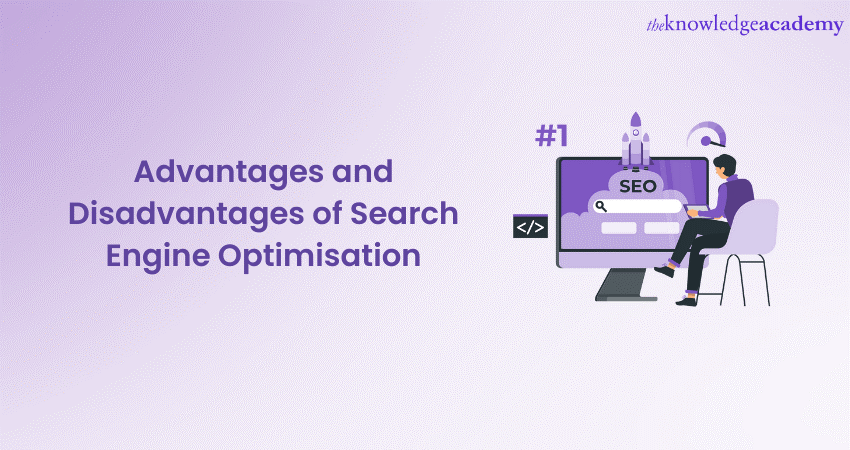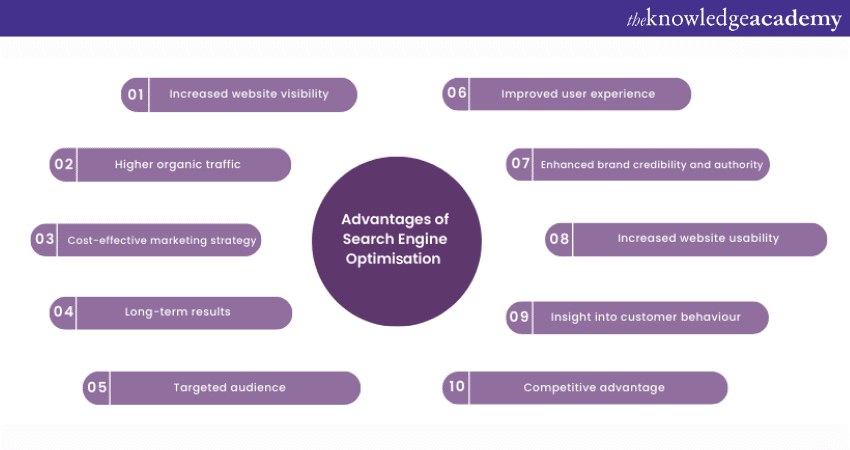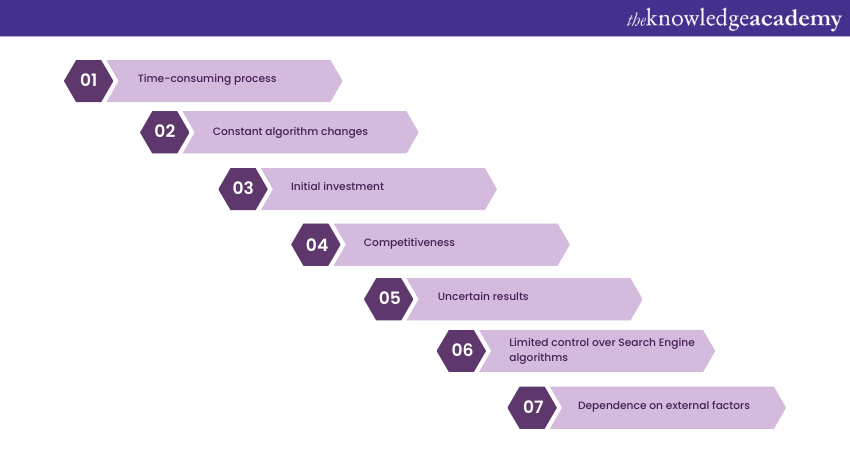We may not have the course you’re looking for. If you enquire or give us a call on 01344203999 and speak to our training experts, we may still be able to help with your training requirements.
Training Outcomes Within Your Budget!
We ensure quality, budget-alignment, and timely delivery by our expert instructors.

Search Engine Optimisation (SEO) can be defined as the process of optimising a website's structure, content, and design to improve visibility in Search Engine Results Pages (SERPs). By utilising SEO techniques, businesses aim to increase their organic (non-paid) traffic and attract targeted audiences. However, before incorporating it, it is very necessary to know about the Advantages and Disadvantages of Search Engine Optimisation.
According to BrightEdge, SEO drives 1,000%+ more traffic than organic social media. Despite the enhanced traffic and the other advantages that SEO provides, it also has a few drawbacks businesses must consider before incorporating it. In this blog, we will tell you all you need to know about the different Advantages and Disadvantages of Search Engine Optimisation. Read more to find out!
Table of Contents
1) Advantages of Search Engine Optimisation
a) Increased website visibility
b) Higher organic traffic
c) Cost-effective marketing strategy
d) Long-term results
e) Targeted audience
f) Improved user experience
g) Enhanced brand credibility and authority
h) Increased website usability
i) Insight into customer behaviour
j) Competitive advantage
2) Disadvantages of Search Engine Optimisation
3) Conclusion
Advantages of Search Engine Optimisation
This section of the blog will expand on the different advantages of Search Engine Optimisation.

Increased website visibility
One of the major advantages of SEO is the enhanced visibility it brings to a website. By optimising the website's content, structure, and meta tags, SEO helps it rank higher in Search Engine results pages (SERPs). When a website appears prominently in search results, it gains more exposure and attracts the attention of potential visitors. Improved visibility increases brand awareness and establishes the website as a credible source in its industry.
Higher organic traffic
SEO focuses on driving organic (non-paid) traffic to a website. By targeting relevant keywords and optimising the website's content, SEO attracts users who are searching for information or products related to the website's offerings. Whenever a website ranks higher in search results, it receives a higher number of clicks, resulting in increased organic traffic. Targeted traffic has higher potential for conversions, leading to a better Return on Investment (ROI).
Cost-effective marketing strategy
Compared to other digital advertising methods, SEO is a cost-effective strategy. While there may be initial investments in hiring SEO professionals or implementing SEO Tools, the long-term benefits outweigh the costs. Unlike paid advertising, SEO focuses on organic traffic and does not require continuous payments for each click or impression. Once a website's rankings improve, it can sustain its visibility without additional expenses.
Long-term results
One of the remarkable aspects of SEO is its ability to deliver long-term results. While SEO efforts require continuous monitoring and adjustments, the foundation built through effective optimisation can provide sustainable visibility and traffic over time. Once a website establishes a strong online presence, it becomes more challenging for competitors to outrank it. This sustained visibility and organic traffic contribute to the website's authority and enhance its credibility in the eyes of Search Engines and users.
Targeted audience
SEO enables businesses to target specific audiences based on their search intent. By optimising the website's content and meta tags with relevant keywords, businesses can attract users actively seeking information or solutions related to their industry. This targeted approach multiplies the chances of attracting qualified leads and potential customers. When a website provides valuable and relevant content to its target audience, it fosters trust, credibility, and customer loyalty..
Take the first step towards mastering SEO with our comprehensive SEO Masterclass Course!
Improved user experience
SEO involves optimising multiple aspects of a website, including its structure, navigation, and load speed. By improving these elements, SEO enhances the overall user experience. A website that is simple to navigate, loads quickly, and provides relevant and valuable content engages visitors and encourages them to explore further. A positive user experience not only improves the chances of conversions but also leads to higher customer satisfaction and brand loyalty.
Enhanced brand credibility and authority
When a website consistently appears in top search results for relevant keywords, it builds credibility and authority in the eyes of users. Being listed on the very first page of the search results implies that Search Engines consider the website as a trustworthy and relevant source of information. This positive perception can significantly impact user trust, leading to higher brand credibility and a competitive edge over other businesses in the industry.
Increased website usability
SEO involves optimising various elements of a website, including its structure, navigation, and mobile responsiveness. These improvements not only make it quicker for Search Engine crawlers to manuever and index the website, but also enhance the overall usability for visitors. A well-structured and user-friendly website encourages visitors to stay longer, explore more pages, and engage with the content, ultimately increasing the chances of conversions and customer satisfaction.
Insight into customer behaviour
SEO analytics tools provide valuable insights into user behaviour and website performance. By analysing data such as organic search traffic, keyword rankings, click-through rates, and user engagement metrics, businesses can develop a much better understanding of their target audience. These insights can inform marketing strategies, content creation, and website improvements, leading to more effective customer targeting and higher conversion rates.
Competitive advantage
Implementing effective SEO strategies can give businesses a competitive advantage over their rivals. By outranking competitors in search results, businesses can attract a larger share of organic traffic and potential customers. SEO allows businesses to showcase their unique selling propositions, expertise, and value propositions to a broader audience. Staying ahead of competitors in search rankings can significantly impact brand visibility, market share, and overall business success.
Elevate your social media marketing skills with our introductory Social Media Masterclass Course!
Disadvantages of Search Engine Optimisation
This section of the blog will expand on the disadvantages of Search Engine Optimisation.

Time-consuming process
Implementing effective SEO strategies and achieving significant results can be a time-consuming process. It requires thorough keyword research, content optimisation, link building, and continuous monitoring and adjustments. SEO is an ongoing effort that demands dedication and patience. It may take several months or even longer to see noticeable improvements in organic traffic and search rankings. This time investment can be challenging for businesses seeking immediate results or operating in highly competitive industries.
Constant algorithm changes
Search Engines regularly update algorithms to improve search results' relevance and user experience. These algorithm changes can have a significant impact on a website's rankings, even if it has been optimised effectively. SEO professionals must stay updated with these changes, adapt their strategies, and ensure compliance with the latest guidelines. Constantly evolving algorithms can make SEO a challenging task, requiring ongoing learning and adjustments to maintain and improve search rankings.
Initial investment
Implementing SEO strategies often requires an initial investment. Businesses may need to allocate resources for hiring SEO professionals, investing in SEO tools and software, conducting keyword research, creating high-quality content, and improving website infrastructure. The initial costs can be significant, especially for small businesses with limited budgets. It's important to carefully consider the available resources and the expected return on investment before committing to SEO initiatives.
Competitiveness
The digital landscape is highly competitive, and many businesses are investing in SEO to improve their online presence and attract organic traffic. Achieving top rankings for highly competitive keywords can be difficult, especially for startups or businesses with limited resources. The level of competition can significantly impact the time and effort required to achieve desired SEO results. Businesses must carefully assess their competition and develop effective strategies to stand out in the crowded online marketplace.
Uncertain results
While SEO offers numerous benefits, it does not guarantee immediate or certain results. The effectiveness of SEO strategies can vary based on various factors, including industry competition, website authority, keyword competitiveness, and user behaviour. The impact of SEO efforts may take time to manifest, and there is no guarantee of achieving top rankings or exponential traffic growth. SEO requires continuous monitoring, analysis, and adjustment to ensure the desired results are achieved.
Limited control over Search Engine algorithms
One significant disadvantage of SEO is the limited control businesses have over Search Engine algorithms. Search Engines like Google tend to regularly update their algorithms in order to improve the quality and relevance of search results. These algorithm changes can impact a website's rankings, even if it has been optimised effectively.
As a result, businesses may experience fluctuations in their search rankings and organic traffic, which can be frustrating and challenging to predict or control. This lack of control over algorithm updates can make it difficult to maintain consistent search visibility and can require constant adaptation to stay ahead.
Dependence on external factors
SEO success is often dependent on various external factors beyond the control of businesses. While businesses can optimise their website and content, factors such as backlinks from other websites, social media signals, and user engagement metrics can significantly impact search engine rankings. Gaining high-quality SEO Backlinks and building a strong online presence requires time, effort, and external collaborations.
Additionally, changes in user behaviour, technological advancements, or shifts in industry trends can also influence SEO effectiveness. Businesses must navigate and adapt to these external factors to maintain and improve their SEO performance, which adds an element of unpredictability and complexity to the process.

Conclusion
All in all, Search Engine Optimisation (SEO) plays a crucial role in enhancing a website's visibility, attracting organic traffic, and targeting specific audiences. However, businesses must analyse the Advantages and Disadvantages of Search Engine Optimisation before incorporating SEO into their website. Hope we could provide you with all you needed to know about the pros and cons of Search Engine Optimisation!
Unlock your digital marketing potential with our wide range of comprehensive Digital Marketing Courses!
Frequently Asked Questions
Upcoming Digital Marketing Resources Batches & Dates
Date
 SEO course
SEO course
Fri 7th Jun 2024
Fri 2nd Aug 2024
Fri 4th Oct 2024
Fri 6th Dec 2024







 Top Rated Course
Top Rated Course


 If you wish to make any changes to your course, please
If you wish to make any changes to your course, please


